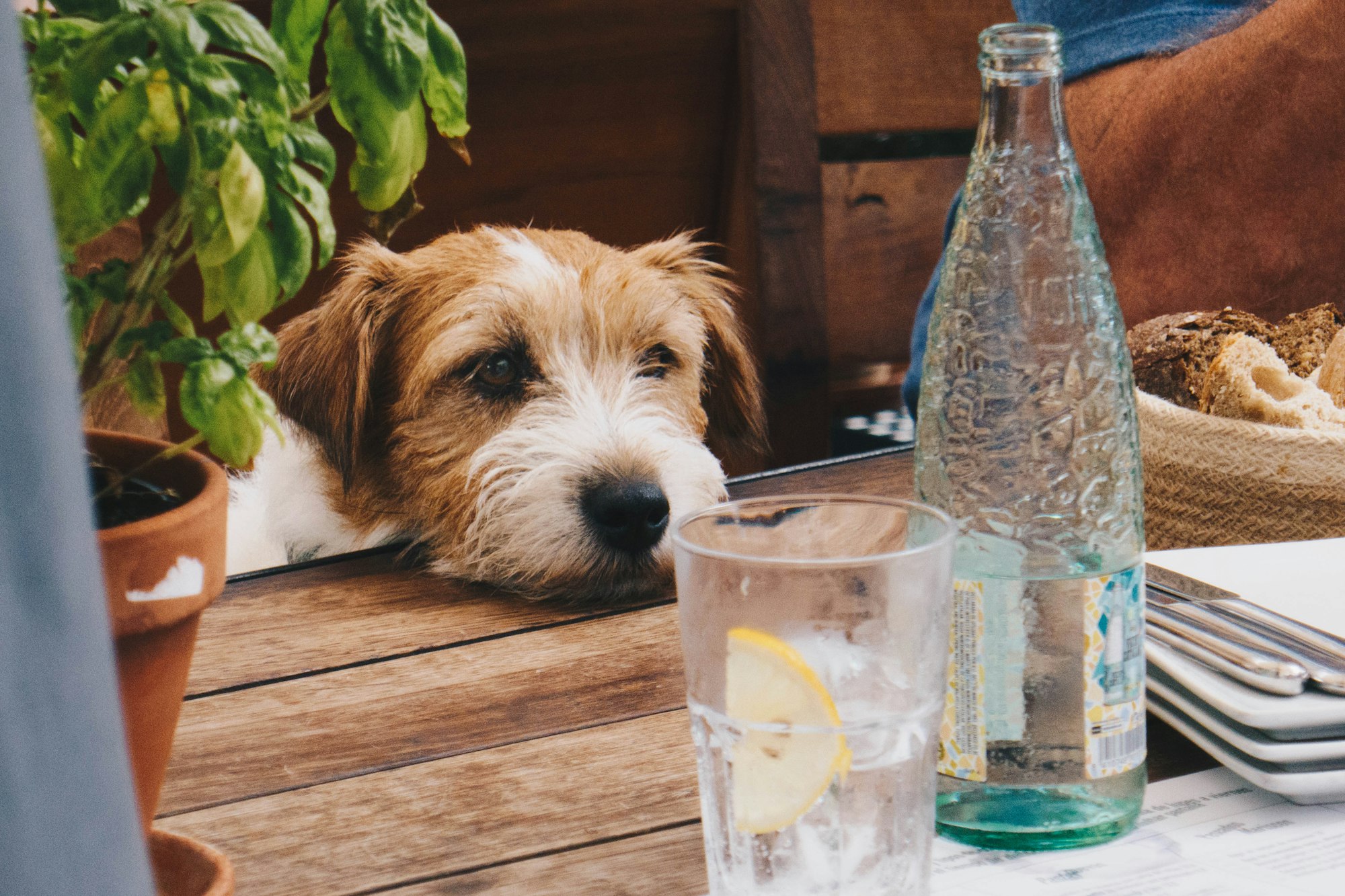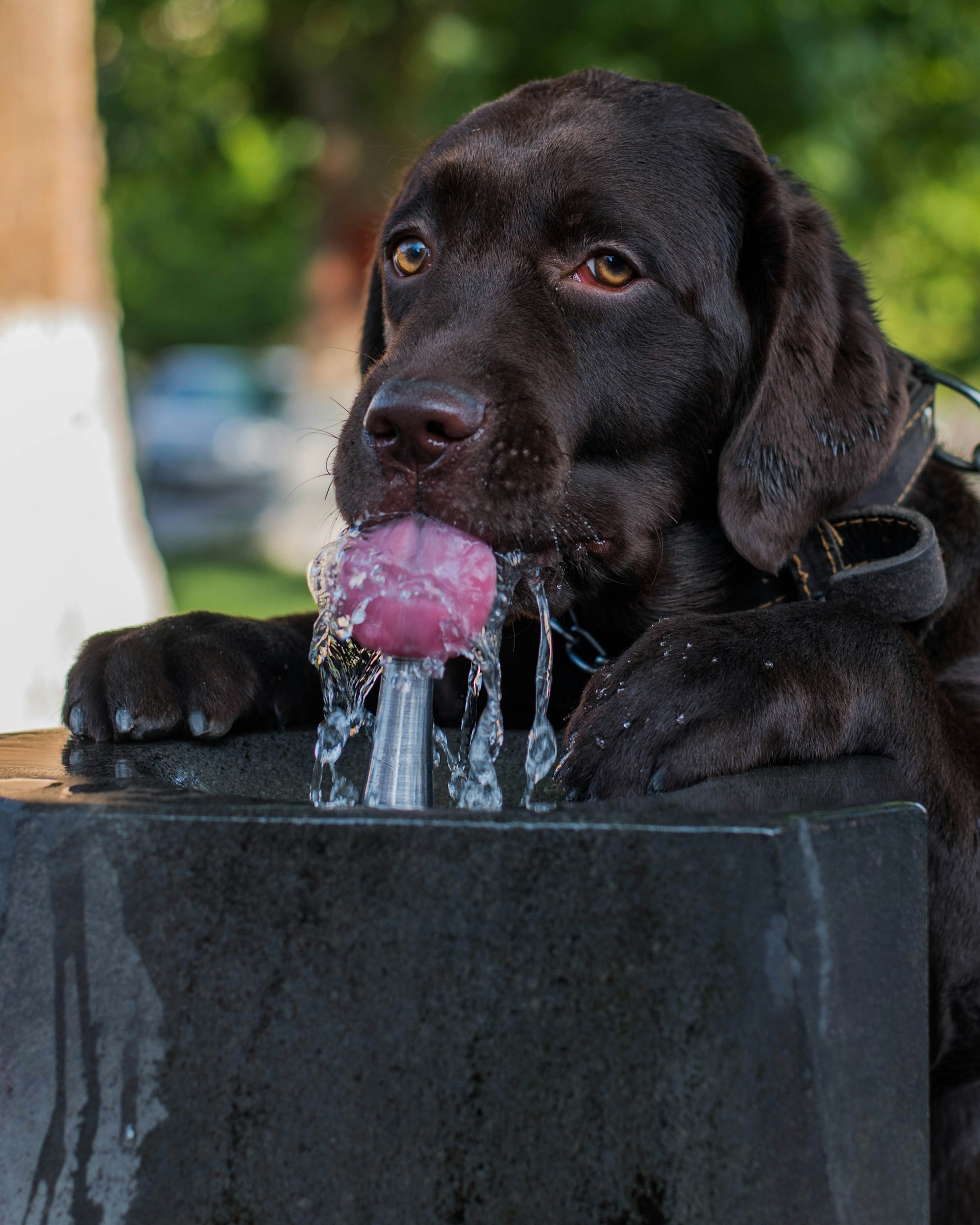Proper hydration is essential for maintaining a dog's overall health and well-being. Water is a vital nutrient that plays a crucial role in various bodily functions, including digestion, circulation, and temperature regulation. As a responsible dog owner, it's important to understand the importance of water intake and ensure that your furry friend is adequately hydrated.
In this comprehensive guide, we will delve into the topic of "how much water should a dog drink," providing valuable insights and practical tips to help you monitor and encourage your dog's water consumption. By prioritizing proper hydration, you can contribute to your dog's overall health and vitality.
The Role of Water in a Dog's Body
Water is essential for a dog's overall well-being, and adequate hydration is crucial for their health and vitality. Dogs drink water to replenish the fluid lost through daily activities, such as urination, respiration, and sweat. It helps to keep their bodily functions running smoothly, ensuring optimal organ function and nutrient absorption.
Additionally, water aids in the digestion process, allowing the body to break down food and extract essential nutrients. It also assists in the elimination of waste products through urine and feces. Without sufficient water intake, dogs can experience dehydration, which can lead to serious health issues. Therefore, providing clean and fresh water for your dog is essential to ensure their well-being and promote a healthy and active lifestyle.
The Consequences of Dehydration
The key reason why dogs drink water is to prevent dehydration. Dehydration can have severe consequences for a dog's health, leading to organ failure, shock, and even death if not addressed promptly. When a dog's body loses more water than it takes in, an imbalance in fluid levels occurs, disrupting normal bodily functions.
That's why it's crucial for dogs to drink water regularly to maintain proper hydration. Various factors can contribute to dehydration, including inadequate water intake, exposure to excessive heat, illness, diarrhea, vomiting, or engaging in strenuous activity. Recognizing the signs of dehydration and ensuring that dogs have access to clean and fresh water is essential for their well-being.
Understanding a Dog's Unique Hydration Needs
Each dog has unique hydration needs influenced by factors such as size, age, breed, activity level, and environmental conditions. Larger dogs generally require more water than smaller breeds due to their larger body mass. Puppies and senior dogs have higher water needs compared to adult dogs.
Working or highly active dogs require additional water to compensate for fluid loss during exercise. Environmental factors such as temperature and humidity levels also affect a dog's water requirements. Dogs with certain health conditions or those on specific medications may have altered hydration needs that should be addressed under veterinary guidance.
Factors Affecting a Dog's Water Consumption

Size, Age, and Breed Considerations
The size, age, and breed of a dog significantly impact their water consumption. Larger breeds have a higher metabolic rate and more body mass, resulting in increased water requirements. Puppies and young dogs have faster growth rates and higher water needs compared to adult dogs. Additionally, certain breeds, such as those with short muzzles or thick coats, may be more prone to overheating and require extra water to maintain proper hydration.
Activity Level and Exercise
The level of physical activity and exercise a dog engages in directly affects their water intake. Dogs that are highly active or participate in rigorous exercise, such as agility training or running, will require more water to replace the fluids lost through panting and sweating. It's important to provide access to water before, during, and after physical activity to prevent dehydration.
Environmental Factors
Environmental factors play a crucial role in a dog's water intake, highlighting why dogs drink water. Temperature and humidity levels directly impact their hydration needs. In hot weather and high humidity, dogs regulate their body temperature through panting, leading to increased water loss. Therefore, they drink water to replenish the fluids lost and maintain proper hydration.
Dry environments also contribute to moisture loss, emphasizing the importance of providing sufficient water to prevent dehydration. As responsible pet owners, it is essential to be mindful of these environmental factors and ensure that our dogs have access to fresh and clean water at all times. By meeting their specific hydration needs, we can help them stay healthy, active, and well-hydrated.
Health Conditions and Medications
Certain health conditions, such as kidney disease or diabetes, can affect a dog's water consumption and hydration needs. Dogs with these conditions may require increased water intake to support their health and prevent complications. Kidney disease, for example, can cause increased thirst and urine output, making adequate hydration essential.
Additionally, certain medications may have diuretic effects or increase water loss, further emphasizing the importance of maintaining proper hydration levels. Working closely with a veterinarian is crucial to understand and address any special considerations regarding a dog's water consumption, ensuring their health and well-being.
Calculating a Dog's Water Requirements
General Guidelines for Water Intake
While there are general guidelines for a dog's water intake, it's important to remember that each dog is unique, and their water requirements can vary. As a general rule, dogs should have access to clean, fresh water at all times. Dogs drink water to maintain proper hydration, which is essential for various bodily functions.
Water helps regulate body temperature, aids digestion, promotes circulation, and supports organ function. It also helps lubricate joints and cushions organs. A common guideline is that dogs should drink approximately one ounce of water per pound of body weight per day. For example, a 40-pound dog would require around 40 ounces (or about 1.2 liters) of water daily.
However, this is just a starting point, and adjustments may be necessary based on individual factors such as size, age, activity level, and environmental conditions. Monitoring your dog's water intake and consulting with your veterinarian will ensure they stay adequately hydrated.
Measuring Water Intake Based on Body Weight
To ensure your dog is adequately hydrated, it can be helpful to measure their water intake based on their body weight. Start by measuring the amount of water you provide to your dog in a 24-hour period. Subtract any leftover water from the total amount offered. By measuring the difference, you can estimate your dog's actual water consumption. This method can give you a better understanding of their specific needs and help you identify any significant deviations from their usual intake.
Adjusting Water Needs for Specific Circumstances
Certain circumstances may require adjustments to a dog's water intake. For example, during hot weather or increased physical activity, dogs will need more water to stay hydrated. Pregnant or nursing dogs also have increased water needs to support their own health as well as the growth and development of their puppies. Additionally, dogs with certain health conditions or on specific medications may require increased water intake as directed by their veterinarian. It's essential to monitor your dog's water intake and make adjustments as necessary to ensure their hydration needs are met.
Monitoring and Encouraging Water Intake

Providing Access to Fresh and Clean Water
One of the most critical aspects of ensuring proper hydration for your dog is providing access to fresh and clean water at all times. Keep your dog's water bowl filled with clean water, and change it regularly to prevent contamination and ensure freshness. Stainless steel or ceramic bowls are recommended, as they are durable, easy to clean, and less likely to harbor bacteria compared to plastic bowls.
Choosing the Right Water Bowl or Dispenser
The type and design of the water bowl or dispenser can also influence your dog's water consumption. Opt for a bowl that is appropriately sized for your dog, allowing them to comfortably drink without their whiskers touching the sides. Some dogs prefer elevated bowls, which can be beneficial for larger breeds or those with joint issues. Consider using a water dispenser or fountain that provides a continuous flow of water, as some dogs are more inclined to drink from moving water sources.
Water Temperature and Preference
Some dogs may have specific preferences when it comes to water temperature. While most dogs prefer cool or room temperature water, some may enjoy slightly chilled water, especially during hot weather. Experiment with different water temperatures to see what your dog prefers. However, avoid providing extremely cold water, as it can cause discomfort and potentially shock the system.
Water Consumption Monitoring Techniques
Monitoring your dog's water consumption is crucial to ensure they are drinking enough. Keep track of the amount of water you provide and measure any leftover water to estimate their intake. You can also use graduated water bowls or specific measuring devices designed for this purpose. Monitoring changes in your dog's water intake can help identify any potential health concerns or changes in their hydration needs.
Encouraging Hydration in Picky Drinkers
Some dogs may be picky drinkers and show reluctance to drink an adequate amount of water. There are a few strategies you can try to encourage hydration in picky drinkers. One approach is to add a small amount of low-sodium chicken broth or a splash of water from canned tuna to their water bowl to enhance the flavor and make it more enticing.
You can also try offering different types of water bowls or dispensers to see if your dog has a preference for a particular design. Additionally, incorporating wet food into their diet can help increase their overall moisture intake. If you're concerned about your dog's hydration, consult with your veterinarian for further guidance and possible solutions.
Recognizing Dehydration in Dogs
Signs and Symptoms of Dehydration
It's essential for dog owners to be able to recognize the signs and symptoms of dehydration. Some common indicators include:
- Lethargy or weakness: A dehydrated dog may appear tired and lack energy. Dry gums and sticky saliva: Check your dog's gums, and if they are dry or sticky to the touch, it may indicate dehydration.
- Sunken eyes: Dehydration can cause the eyes to appear sunken or dull.Loss of skin elasticity: Gently pinch the skin on the back of your dog's neck. If it takes longer than usual for the skin to return to its normal position, it could be a sign of dehydration.
- Decreased urination: Noticeable reduction in the frequency and volume of urine can be a sign that your dog is not getting enough water.
- Dry nose and mouth: A dehydrated dog may have a dry nose and sticky or tacky mouth.
If you observe these symptoms in your dog, it's important to take immediate action to address their hydration needs.
Dealing with Mild to Moderate Dehydration
If you suspect that your dog is experiencing mild to moderate dehydration, there are several steps you can take to help re-hydrate them. Offer small amounts of water at regular intervals to avoid overwhelming their stomach. You can also provide ice cubes or ice chips for them to lick on.
Consider offering them a diluted electrolyte solution made specifically for dogs, which can help replenish lost fluids and electrolytes. If your dog doesn't show improvement or if their condition worsens, it's crucial to seek veterinary attention.
Seeking Veterinary Care for Severe Dehydration
Severe dehydration requires immediate veterinary care. If your dog is showing severe signs of dehydration, such as extreme lethargy, sunken eyes, or an inability to drink water, it's important to contact your veterinarian or an emergency veterinary clinic right away. Intravenous (IV) fluids may be necessary to re-hydrate your dog effectively. Delaying treatment for severe dehydration can have serious consequences on your dog's health and well-being.
Tips for Ensuring Proper Hydration

Establishing a Regular Drinking Routine
To ensure your dog stays properly hydrated, establish a regular drinking routine. Offer fresh water to your dog at specific intervals throughout the day. Monitor their water consumption and adjust the amount provided based on their individual needs. Regularity in water availability can help encourage consistent hydration.
Hydration Strategies for Active Dogs
If you have an active dog that engages in vigorous exercise or participates in activities such as agility training or running, proper hydration is especially crucial. Before exercise, ensure your dog has access to water and encourage them to drink. During extended periods of activity, provide water breaks to prevent dehydration. Additionally, consider using portable water bottles or collapsible bowls to provide water during outdoor excursions.
Managing Water Intake During Travel or Outdoor Adventures
When traveling or engaging in outdoor adventures with your dog, it's important to plan for their hydration needs. Bring an adequate supply of water and portable bowls or dispensers. Research the availability of water sources at your destination and plan accordingly. Remember to offer water to your dog frequently, especially during hot weather or strenuous activities. Be mindful of the temperature of the water and ensure it remains fresh and clean. Portable water filters or purification tablets can also be useful if you need to rely on natural water sources.
Hydration and Diet: The Role of Moisture in Food
Diet plays a significant role in a dog's hydration. Wet or moist food contains a higher water content than dry kibble, contributing to their overall hydration. If your dog primarily consumes dry food, consider incorporating wet food into their diet or adding water to their kibble to increase their moisture intake. However, it's important to consult with your veterinarian to ensure a balanced and appropriate diet for your dog.
Supplementing Water Intake with Hydrating Treats or Broths
In addition to regular water intake, you can supplement your dog's hydration with hydrating treats or broths. There are commercially available treats specifically designed to provide moisture and hydration. Alternatively, you can make your own hydrating treats using ingredients like low-sodium broth, pureed fruits, or frozen watermelon. Just ensure that any homemade treats are safe for canine consumption and do not contain harmful ingredients.
Special Considerations and Challenges
Dogs with Medical Conditions and Increased Water Needs
Some medical conditions, such as kidney disease or diabetes, can affect a dog's water needs. Dogs with these conditions may require increased water intake as directed by their veterinarian. If your dog has a medical condition, closely monitor their water intake and follow any specific guidelines provided by your veterinarian.
Senior Dogs and Hydration
Senior dogs may be more prone to dehydration due to age-related factors. They may have a decreased sense of thirst or be less mobile, making it challenging for them to access water. Monitor your senior dog's water intake closely and consider providing multiple water stations throughout the house. Elevated bowls can also be beneficial for senior dogs with mobility issues.
Over-hydration: Is There Such a Thing?
While it's crucial to prevent dehydration, over-hydration can also be a concern. Over-hydration, or water intoxication, occurs when a dog consumes an excessive amount of water within a short period, diluting the electrolytes in their body. This can lead to hyponatremia, a potentially life-threatening condition. To avoid overhydration, provide water in moderation and avoid excessive or forceful water intake, especially after vigorous exercise.
Managing Water Intake for Dogs with Urinary Issues
Dogs with urinary issues, such as bladder stones or urinary tract infections, may require specific management of their water intake. Your veterinarian may recommend adjusting their water consumption or incorporating supplements to promote urinary health. Follow their guidance and monitor your dog's condition closely.
Water Intake for Pregnant or Nursing Dogs
Pregnant or nursing dogs have increased water needs to support both their own hydration and the growth and development of their puppies. Ensure that they have access to fresh and clean water at all times, and consider providing multiple water sources to accommodate their increased demand.
Conclusion
In conclusion, it's important to pay attention to the way your dog drinks water. Some dogs have unique preferences when it comes to drinking water, such as lapping it up from a running faucet or preferring a specific type of water bowl. By understanding and accommodating their preferences, you can encourage them to drink an adequate amount of water.
Remember that water is a fundamental necessity for dogs, and their health and well-being depend on it. So, make sure to prioritize their hydration needs and provide them with a constant supply of fresh, clean water. With proper hydration, you can help your dog lead a happy, healthy, and active life.

